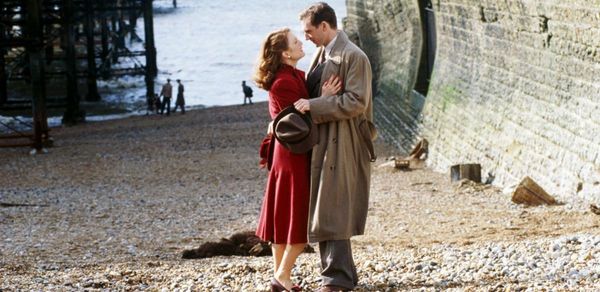Eye For Film >> Movies >> The End Of The Affair (1999) Film Review
The End Of The Affair
Reviewed by: Angus Wolfe Murray

It rains even more than in Angela's Ashes. Umbrellas everywhere. As a symbol of bad hair days, the wet stuff has definitely been overused. There is a decorative feel to Jordan's Greenery. The presence of a set dresser and costume designer is tangible, as if their breath still warms the air. Colours are suitable for inclement weather, shades of dead bracken in autumnal light, while manners reflect the restrictions of a city at war.
Writer/director Neil Jordan shuffles time to give this tale of adultery in London during the Blitz a jazzier spin. Flashbacks, flashforwards, inserts of memory, such as a hand on a thigh and the slow motion rerun of bomb impact, mean that you have to keep your wits about you to understand where the past fits into the present and how the now-of-a-moment mirrors the then-of-an-action that changed everything.

Graham Greene's novel is an intense literary work, wracked with religious guilt. Jordan has filleted the Catholicism, although there is a handsome priest masquerading as a rival lover.
Stephen Rea's performance, as the cuckolded husband, is so low-key he almost dissolves into the wallpaper. Not only does this explain the affair, but leaves a question hanging: "How on earth did a vibrant, sensual woman with a healthy sex drive ever marry this dry old stick?"
Where the film succeeds is at its emotional heart. Ralph Fiennes, as the writer Bendrix, has an intellectual severity that abhors sentiment, as well as the ability to play upper middle-class roles without reverting to ex-public school stereotype. He embodies repressed passion and rapacious jealousy, giving Bendrix the benefit of humanity within a character that is selfish and solitary.
Julianne Moore, as Sarah Miles, is a revelation. Not only is the accent and body language attuned to the choreography of a Mayfair cocktail party, but her flirtatious charm complements the spirit of 1940. Sarah is no foxy fool with a head full of dandelion seeds. She has courage, which Moore assimilates, exposing the vulnerability of hopeless love with a fierce conviction.
If performance and style was everything, Jordan's adaptation would shine. Devoid of Greene's prose, however, the plot is thin. "What can one write about happiness?" Bendrix asks. What, indeed?
Reviewed on: 19 Jan 2001


















